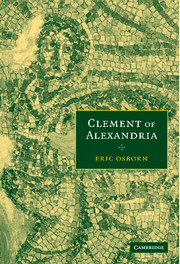Book contents
- Frontmatter
- Contents
- Preface
- List of abbreviations
- 1 Life and works
- PART I DIVINE PLAN/ECONOMY
- PART II DIVINE RECIPROCITY
- PART III FAITH AND SALVATION
- 7 The Spark and ferment of faith (exc 1.1.3)
- 8 Arguments for faith
- 9 Knowledge, sciences and philosophy
- 10 Church and heresy
- 11 Twofold hope
- 12 Love and reciprocity
- Conclusion
- Appendix: Irenaeus and Clement
- Select Bibliography
- Subject index
- Citations from Clement
- Citations from the Bible
- Citations from ancient authors
11 - Twofold hope
Published online by Cambridge University Press: 06 July 2010
- Frontmatter
- Contents
- Preface
- List of abbreviations
- 1 Life and works
- PART I DIVINE PLAN/ECONOMY
- PART II DIVINE RECIPROCITY
- PART III FAITH AND SALVATION
- 7 The Spark and ferment of faith (exc 1.1.3)
- 8 Arguments for faith
- 9 Knowledge, sciences and philosophy
- 10 Church and heresy
- 11 Twofold hope
- 12 Love and reciprocity
- Conclusion
- Appendix: Irenaeus and Clement
- Select Bibliography
- Subject index
- Citations from Clement
- Citations from the Bible
- Citations from ancient authors
Summary
ETHICS AND HOPE
Justin describes Christians as ‘men of good hope’ (1 apol. 14.3). For Clement, the good life depends upon a sovereign hope. The hope of Christians is that they should become like Christ, and this is the theme of all ethical discourse. As has just been noted,
We must follow where the word leads; and if we depart from it we must fall into ‘endless evil’. For when it is pure and set free from all evil, the mind is somehow capable of receiving the power of God and the divine image is set up in it. ‘And everyone who has this hope in the lord purifies himself,’ says the scripture, ‘even as he is pure’.
Only through hope can the believer have a fitting attitude towards God; for he considers how he should live, who will one day become divine and is now being made like God (7.1.3.6). Life is a preparation which confesses the way of the cross in purity and obedience. It sheds the blood of faith along its path until its final departure (4.4.15.3). Clement draws on Paul, for whom tribulation produces patience and patience leads to unashamed hope (Rom. 5:3–5) (4.22.145.1). Christian hope depends upon the God who works all things for good (4.26.167.4). Clement sees life as an ascent in hope to this God, and he prays that the spirit of Christ will bear him above to the Jerusalem which is the object of his hope (4.26.172.2).
- Type
- Chapter
- Information
- Clement of Alexandria , pp. 226 - 253Publisher: Cambridge University PressPrint publication year: 2005
- 1
- Cited by



